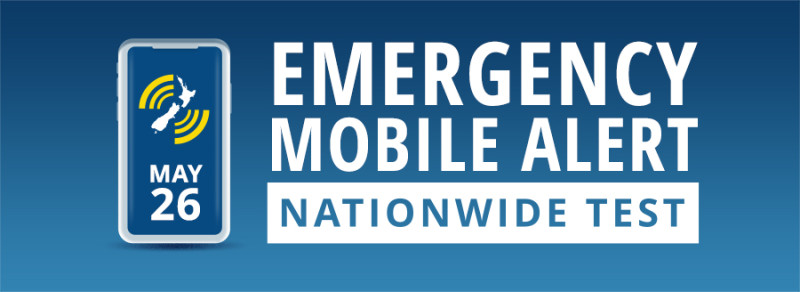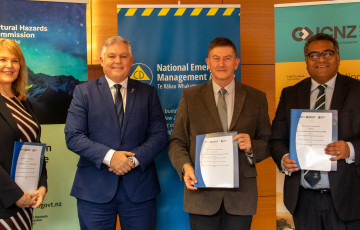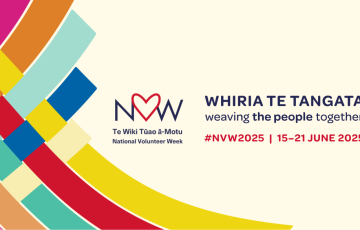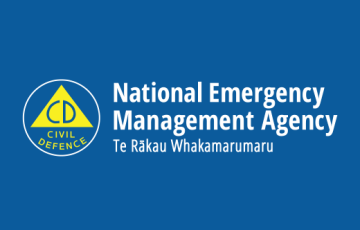Nationwide test of Emergency Mobile Alert system this Sunday

This year’s nationwide test of the Emergency Mobile Alert system is happening on Sunday 26 May between 6-7pm.
On 26 May, there will be one phone alert you can’t ignore – but don’t worry, it’s a test.
This year’s nationwide test of the Emergency Mobile Alert system is happening on Sunday 26 May between 6-7pm, says the National Emergency Management Agency (NEMA).
Emergency Mobile Alert is one tool we’re able to use to alert people when their life, health or property is in serious danger, says Director Emergency Management John Price.
“The nationwide test is important to give us confidence that the system will perform as it should in an emergency. The test allows NEMA to check that the Emergency Mobile Alert system is working as it should, and gives you a chance to check that your phone is receiving the alerts.
“In an emergency, an alert may be geotargeted to affected areas. If you get an alert, you must stop and read the message, and take it seriously. It will tell you what the emergency is and what to do. It will also tell you which agency sent the message and, if needed, where to go for more information.
“From previous tests, we know that around nine in ten people either received the alert themselves or were near someone who did. Most phones can receive the alert and we expect a similar proportion of people to receive it this year.”
John Price says Emergency Mobile Alert is an additional channel to help keep our communities safe and does not replace other ways to stay informed, or the natural warning signs that can indicate danger.
“I want to be clear that no form of technology is completely failsafe. Emergency Mobile Alert does not replace other alerting channels, like radio or social media, or the need to act on natural warning signs.
“Please act immediately if you feel your life is in danger. Don’t wait for an alert, don’t wait for an official warning - just get yourself to safety.
“For example, if flood waters are rising – self evacuate and move to higher ground. If you are near the coast and an earthquake is long or strong, get gone - move immediately to the nearest high ground, or as far inland as you can.
“Long or Strong Get Gone is extremely important as in a local source tsunami there won’t be time for an official warning. Knowing the natural warning signs and taking immediate action could save your and your family’s lives.
“And lastly, get prepared ahead of the test night. If you don’t already have an emergency plan, now's the time for a ‘prep talk’. Get ready so you and your whānau know what to do when an emergency happens. Head to the Get Ready website for advice and help making a plan.”
John Price says that if people don’t want to receive Sunday’s nationwide test alert, they are advised to switch off their mobile devices between 6pm and 7pm.
For more information on Emergency Mobile Alert visit: https://getready.govt.nz/en/prepared/ema.
What you need to know:
- No need to subscribe. You don’t need to sign up or download an app. Just make sure your phone is on, and your operating system is up to date.
- Works by geo-targeting. Emergency Mobile Alerts can also be targeted to affected areas, so you will only get them if the emergency is in your area. Sunday’s test alert will be sent to all areas in New Zealand with mobile coverage.
- You can’t opt out. As Emergency Mobile Alert is about keeping you safe, you won’t be able to opt-out. Your phones may show optional settings used in other countries, but in New Zealand we use a special broadcast channel that is permanently on.
- Switch off if you don’t want to receive the test alert. If you have a health condition, are concerned about the alert giving you a fright or waking the little ones, please switch your phone off, or turn flight mode on from 6-7pm on the night of the test. If you turn it on within this period, you may still receive the alert.
- It’s not the only way to receive alerts. Emergency Mobile Alert is an additional channel to help keep people in New Zealand safe and does not replace other alerting channels such as radio, television, websites and social media, or the need to take action after natural warnings. If you feel your life may be in danger, don’t wait for an official warning. Take immediate action. Remember – long or strong, get gone.
- What if I’m driving? If you are driving when you receive an alert, wait until it is safe to stop and then check the message.
- Who can send an alert? Emergency Mobile Alert messages can only be sent by the National Emergency Management Agency, Civil Defence Emergency Management Groups, NZ Police, Fire and Emergency New Zealand, Ministry of Health and Ministry for Primary Industries. Alerts will only be sent when there are serious threats to life, health and property, and, for test purposes.
- Make a plan. Take the time to make your own emergency plan which includes what to do, where to go, who can help you and who might need your help. You can make a plan online at https://getready.govt.nz/plan/.
Published: May 23, 2024, 11:42 AM



